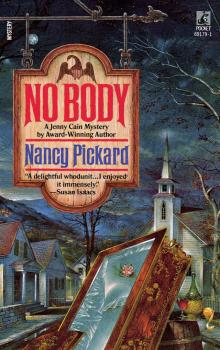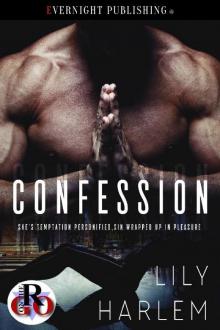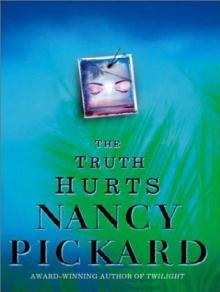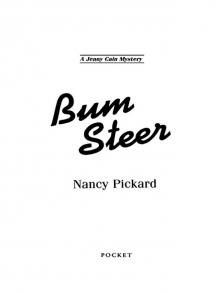- Home
- Nancy Pickard
The Virgin of Small Plains Page 7
The Virgin of Small Plains Read online
Page 7
At graveside, the minister’s lips were so cold he could barely move them to pray. He mumbled everything he said, fumbling all that he touched. Finally, he put his Bible on a metal folding chair, stuck his bare, chapped hands down into the pockets of his black overcoat, and left them there. Rex wished he would just mumble “Amen,” and release everybody to go back to the heaters in their cars, vans, and trucks.
“Come on,” Rex thought as the minister lingered overlong on a prayer.
There was a space, a body’s width, between Judge Tom Newquist and seventeen-year-old Jeff Newquist, as if they had saved a place for someone who hadn’t gotten there yet. Rex saw Abby staring at that space, and his heart felt bad for her. Her face was still bruised from her accident in the truck, and she kept her left arm close in to her side, as if it hurt her. She’d heal from those wounds, he knew. But some things, some heartaches, rejections, and surprises, you just never got over. Abby was probably never going to get over the feeling that she had done something wrong.
Me, too, Rex realized, with a start. He had his own reasons for feeling that way.
He glanced at the burial marker of the girl who had died on that other January 23. The girl’s gravestone had no name on it, because she had never been identified. It held only the year of her death, and an epitaph: Peace Be Unto You.
When the minister finally let them go, Rex took note of the number of people who just happened to pass by the grave of the murdered girl, and touch it. Abby’s prediction had been right—he’d heard more than one person say something like, “Well, you know why Nadine Newquist was out in the cemetery, don’t you? She was trying to get cured of her Alzheimer’s, poor thing. In her mind, she probably thought that if she could drag herself to the cemetery, she’d get a miracle.”
Around town, they not only attributed healing powers to her, they called her the Virgin.
The first thing wrong with that theory, in Rex’s opinion, was that she hadn’t died a virgin. Rex would never forget his father’s voice stating she had been raped. He would never forget the blood frozen on her legs. Of course, nobody outside of his family knew about that because his father had forbidden them to talk about it. But a cockamamie rumor had gone around that when Doc Reynolds examined her, he had pronounced that prior to the attack she was pure as the driven snow. Rex supposed that appealed to people’s love of melodrama. She couldn’t just be an unfortunate girl who got killed, she had to be a virgin, to boot.
The second thing wrong with that theory was that Doc couldn’t necessarily have proved such a thing, even if he had wanted to. And a third thing wrong with it was that Quentin Reynolds would have sliced himself open with his own scalpel before he would have spoken a cliché like “pure as the driven snow.”
I’ll show you a miracle, Rex thought, as sunlight cut through the clouds and lit up the plains. He looked at his boots, which were standing in cold slush. This snow is finally starting to melt.
On his way out of the cemetery Rex made a point of walking up to a heavyset woman he recognized as one of Nadine Newquist’s hired nurses.
“Mrs. Kolb,” he said to her. “Have you got a minute?”
When she indicated she did, Rex drew her off to the side, away from other people leaving the service. “You’ve heard how Mrs. Newquist got outside that day?” he asked her, looking straight into her brown eyes.
“Somebody left the door open,” she said, with a raised eyebrow and a judgmental air.
Rex could be blunt when it suited him. “The judge says one of you nurses did it.”
“Well, then, he’s a lying bastard!” the woman exclaimed in a voice loud enough to draw startled glances from the people closest to them. She saw the reaction and lowered her voice to a furious whisper. “I was the last one on duty, as I’m sure you know or you wouldn’t be talking to me about it, and I will swear to you on any stack of Bibles, up to any height you want me to swear, that I never…never… left that door open. It was worth our jobs to leave that house unlocked! That was the first rule of the house—always make sure the outside doors are locked. If he said that, then he’s just trying to make other people take the blame for what is surely, as Christ is my witness, his own damned fault.”
Rex scratched his chin with the gloved forefinger of his left hand. “You think he left the door open?”
“Oh, not him, he’d never make a mistake like that,” she said bitterly. “But if he wasn’t watching her close enough…”
She let the implication hover between them.
Rex made sure he understood. “If the judge didn’t watch over his wife closely enough she might have opened the door herself?”
“Could have. Or…”
Rex raised his eyebrows inquisitively.
“She wasn’t the only one in that house without a sensible thought in her head,” the nurse said, in the same tart tone in which she had spoken of the judge.
Rex looked over her head at the departing widower and his teenage son. Just as he did so, both of the Newquist men happened to look over to where Rex stood talking to their former nurse.
Jeff Newquist reminded Rex a little bit of Mitch around that age, although there wasn’t any genetic reason he should. But he had picked up certain Newquist mannerisms just from living with them that gave the illusion that he actually looked like them. He had a confident—in Jeff’s case, cocky—way of walking that mimicked Tom’s, and an amused squint of the eyes that came straight from Nadine. His posture wasn’t as good as Tom’s, though; he slumped a bit about the shoulders. He wasn’t as good looking as the “real” Newquist men. He was tall, but a lot skinnier, and nothing like the athlete that either Tom or Mitch had been. His eyes were a color that no Newquist had ever had, and his complexion was paler, blotchier than theirs. That there were different genes at work in him was obvious, but only if you looked past the walk, the height, and the look in the eyes.
Rex looked back at Mrs. Kolb. “You think Jeff left it open?”
“Well, he left his clothes on the furniture and his towels on the floor and his dirty dishes any place he happened to be.”
“What about doors, did he leave them open or unlocked, too?”
“Well,” she said, sounding reluctant, “I never saw him do it.”
Rex nodded, and released her with a smile. “Thanks.”
As he watched her walk off, he wasn’t sure why he was pursuing the matter. Somebody accidentally, or unthinkingly, left a door open and a mentally deranged woman had walked out of it to her death. It was a human, if unadmirable, thing to do. It could have been a nurse, despite what this one had claimed; it could have been the judge, or Jeffrey, or even Rex’s own mother, who had visited her old friend Nadine the previous day. It could have been Rex’s own father, who had stopped by to see Tom the night before, or any one of a number of people who might have visited, as people did in small towns every day, with gifts of flowers or food, or just to hold a senile woman’s hand for a few minutes. What it wasn’t was criminal, unless there had been some conscious intention to speed a suffering and inconvenient woman to her death.
She was dead. That seemed more of a blessing than not, to Rex.
She was dead and he was the sheriff. And he didn’t know what, if anything, he was going to do about the uncomfortable juxtaposition of those two facts.
Mitch Newquist didn’t come back for his mother’s funeral, but an idealized ghost of him did, albeit a ghost who stirred up resentment on the day of Nadine’s burial. Rex heard it in the whispers at the judge’s house, at the reception afterward. When Rex walked in he noticed the house had a cigar smell, which Nadine would never have tolerated. He also wondered what she would have thought of the homemade catering by the church ladies. Too many casseroles, she might have sniffed. Rex headed straight for them, the macaroni and cheese, the green beans with fried onion rings on top, the apple pies.
“You’d think a son could come home for his own mother’s funeral!” he overheard.
But then he also heard the
turnaround to sympathy. “It’s sad, really, when a man can’t even come back to his own mother’s funeral.”
This last was said with a sidelong glance at Abby, a glance that burned Rex up.
Good grief, people, he wanted to snap at them, it’s ancient history! Let it go!
And now, unfortunately, the idea that Abby might have saved Nadine, if only her truck hadn’t wrecked, was feeding the lie of Abby’s Fault. It was Abby’s fault that Mitch left town. Abby’s fault that nobody got to Nadine in time. “Did you have your seat belt on?” Rex’s father asked her. “You sure that truck isn’t too much for you, Abby?” her own father asked. “You can’t just slam on the brakes, you have to turn into the skid,” another old codger informed her, as if she’d grown up in Miami. “You’d better trade in that old truck-bucket for one with air bags,” somebody else opined.
Rex remembered Abby’s bloody forehead, and that she’d had to make a choice between saving herself and calling for help for Nadine, and he wanted to slug every one of them. As for causing Mitch to leave, Rex didn’t know why their best friend had gone away, but he would have bet everything he owned that it wasn’t Abby’s fault. It infuriated him when people tried to blame her for it.
In the years since Mitch Newquist had packed up and left town overnight, he had turned into a Golden Boy for a lot of people who hadn’t known him all that well—a Joe Montana on the football field, a Jim Ryan on the track, a born politician, entrepreneur, rancher, and general all-round Renaissance man. At first, when he’d left, there’d been some nasty speculation that maybe he had killed the girl, but that had quickly died away as more people came to find out he had an alibi in Abby. After that, his memory had taken on a glow. Some people even remembered him as playing the piano, an alteration of history that made Rex laugh rudely when he heard it. If Mitch had stayed, he would have benevolently run the town, was the underlying assumption, like a handsome, strapping, blond god with a grin that never aged. Nicer than his mother, less autocratic than his dad, he was Small Plains’ star that got away…
The Mitch Myth, Rex called that one, though nobody liked it when he did.
How this image fit a man who didn’t return for his own mother’s funeral was a conundrum nobody seemed willing to address. Just like they had never figured out how to harmonize the dissonance between the Abby they all knew as a nice person, and the pushy broad who forced her boyfriend to leave his hometown forever to escape her clutches. Both paradoxes—the actual eighteen-year-old boy and the romanticized one, the actual Abby and the One to Blame—existed in many minds, like alternate realities held in opposite hands.
It all came down to one twenty-four-hour period:
Before January 23, 1987…
After January 23, 1987.
You were seventeen years old and fell asleep over your homework one night, Rex thought, as he left the reception early. Memories he had fought all day to keep at bay came roaring in like the wind that had snaked around his ankles at the cemetery. And when you woke up, everything was changed. For you, for your family, for your best friends, for your hometown, forever.
Chapter Nine
January 23, 1987
By the time Mitch got home that night from Abby’s house, his bare hands were so cold he could hardly get his house key out of his pants pocket and insert it in the door. When he finally got inside, he looked down and saw that his hands and feet were red from the cold. His coat and shoes were back in Abby’s bedroom. Snow coated his clothes; he felt it dripping from his hair, he felt it on his eyelashes.
Nothing on the outside of him matched the freezing shock he felt within.
He lifted his head and slowly looked around, as if seeing his own home for the first time. There was Persian carpet at his feet and climbing the stairs to the second floor. Paintings lined the front hallway. His mother’s favorite potpourri, scattered about the rooms in widemouthed Chinese porcelain bowls, permeated the air in a comforting, suffocating kind of way. He looked left into the living room, then right into the dining room. Everything was immaculate as both of his parents preferred for it to be. He felt glad to step back into an ordered universe, but it also felt unreal to him, as if he had stepped into a fantasy.
A door to his father’s office at the back of the house opened, and suddenly his father stood in the doorway, dressed in pajamas, slippers, and a bathrobe, staring at him. Tom Newquist was a big man; at six feet four, he was four inches taller than his only child. With a jowly face and beefy physique, he cut an imposing figure, whether in the judicial robe of the Sixth Judicial District, or at home in his bathrobe. It wasn’t unusual for him to be working late; he liked to work in the quiet and solitude of his home after his wife and son had gone to bed, and didn’t like it whenever either one of them decided to stay up late for some reason.
“Mitchell! What in the world—”
“Dad.” His lips trembled, his voice shook. “I have to tell you something.”
“You’re barefoot! Where have you been? Are you drunk?”
“No! Dad, listen to me, something’s happened—”
His father stepped forward. “Were you in a car accident? Are you all right? What were you doing out driving in this storm?”
“Dad!” He raised his voice. “I was at Abby’s! I wasn’t in a car! Listen to me!”
His father frowned, unaccustomed to such a tone. “Put on some other clothes first. Get warm. Then come down to my office. And don’t wake up your mother.”
“Dad.” Mitch took a pleading step forward. The single word hung in the air. His voice strained from what felt to him like a superhuman effort to speak in a calm, quiet tone that might compel his father to finally listen to him. Speaking slowly, trying to penetrate his father’s infuriating assumptions, he said, “Do you remember…the girl who used to come and clean for us? Her name was Sarah? She wasn’t from around here. I mean, she was from Franklin.” It was another, much smaller town about twenty-five miles from Small Plains. “Dad, she’s dead. I saw her…I saw…”
His mouth wouldn’t form the words that should come next.
Staring at his father’s face, a face that had gone blank and puzzled, Mitch was struck dumb with the enormity, the awfulness, the sheer weirdness of what he was going to have to say next. Say it! he told himself, screaming at himself inside his head. But he couldn’t, his voice gave out on him, his brain refused to kick in the orders. He was filled with dread at the effect the news he had to give his father might have on the judge. These were his father’s best friends he was going to…to what? Betray was the word that came to him. But that couldn’t be right. He wasn’t betraying anybody, he was only telling about the horrible thing that he had witnessed. It wasn’t his fault that he had seen them do it. It wasn’t something he could just witness and then never talk about to anybody. His father might be their friend, but he was also a judge. Mitch had to tell him, he knew he had to…
His father was frowning, as he might have over some ill-prepared legal briefs that an attorney had submitted to him.
“Who? Was this girl in an accident? What are you saying?”
“Sarah,” Mitch repeated, but then he began to shiver uncontrollably. He couldn’t remember her last name. How awful was that, he berated himself, that he couldn’t even come up with her last name? Through chattering teeth, he managed to say, “I…can’t…talk.” Ten feet away, his father didn’t move. Mitch said, “W-wait for me, okay? I’ll ch-change clothes. I’ll c-come back down…”
He fled to the stairs, and ran up to his room.
When he came back down, he was not only fully dressed in several layers of clothing, including wool socks, but he also had a blanket wrapped around him to try to still his inner, and outer, shivering. But when he sank down on a couch in his father’s office and told the judge what he had witnessed, all he got for his pains, at first, was disbelief.
“First of all,” his father said, sternly, “what were you doing in Quentin’s office?”
“What?”
/>
Mitch froze, taken by surprise by the question. First of all? What kind of stupid “first” question was that? What did it matter? Who cared? Hadn’t his father heard anything he said? A girl was dead! Somebody they knew, somebody who used to work for them, was dead! When Mitch heard his father’s all-too-parental question, he nearly laughed, but stopped himself in time. Caught off guard by a question that felt irrelevant to him, his mind went blank. He felt completely unable to think of a lie.
It seemed his father had a whole litany of questions/demands to spring on him. “Secondly, what were you doing in their house at all at this time of night on a school night? And third, you can’t possibly have seen what you think you did. I think you were drinking, Mitchell. I suspect you may have been taking drugs.”
Mitch threw his head back, and groaned.
“Mitchell!”
This was crazy! Mitch thought, feeling a kind of desperation deep inside. He had just witnessed a barbaric act committed on the dead body of a beautiful girl by one of his father’s best friends, and all his father could do was act like a fucking robot parent!
But then, he thought again, trying to comprehend his father’s strange reactions…of course. He was talking about his father’s best friends, men who were as close to Tom Newquist as Abby and Rex were to him. If his father had come to him with such a story about Rex and Abby, he wouldn’t have believed it, either. Not at first, anyway, and not without some pretty goddamned convincing proof.

 The Scent of Rain and Lightning
The Scent of Rain and Lightning No Body
No Body The Secret Ingredient Murders: A Eugenia Potter Mystery
The Secret Ingredient Murders: A Eugenia Potter Mystery The 27-Ingredient Chili Con Carne Murders: A Eugenia Potter Mystery
The 27-Ingredient Chili Con Carne Murders: A Eugenia Potter Mystery Twilight
Twilight Marriage Is Murder
Marriage Is Murder I.O.U
I.O.U The Virgin of Small Plains
The Virgin of Small Plains Generous Death
Generous Death The Whole Truth
The Whole Truth The Blue Corn Murders
The Blue Corn Murders Say No to Murder
Say No to Murder Confession
Confession Dead Crazy
Dead Crazy The Truth Hurts
The Truth Hurts Bum Steer
Bum Steer